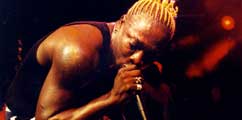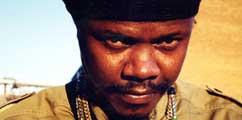- When dancehall lyrics got too unpleasant, the Kingston police were empowered to sieze the equipment of any sound system playing records that seemed to encourage violence.
- The new roots artists are much more hardline that roots’n’culture dreads, as they feel they have to work to reclaim Rasta.
- Although "Boom Bye Bye" was Buju Banton’s record, Shabba Ranks did himself much more harm by endorsing it on British TV.
 |
 |
| Elephant
Man |
Luciano |
| In spite of the original
dancehall reggae irritating the hell out of purists, it was
relatively harmless compared to what it was to become. The
music deliberately lost all sense of being played on
conventional instruments, as computerised sounds were prized
for being exactly that – computerised sounds. The rhythms sped
up and took on a harshness made seemed designed to keep out
the faint hearted, while deejay delivery gained an edge that
removed all vestiges of one love. Likewise the subject matter: the slackness, which was really nothing more than the good natured bawdiness that has featured in most Caribbean music since calypso, turned into outright misogyny and a violent homophobia, while an alarming trend for "gun records" reflected the growing gangsterism in Kingston’s ghettos. Shabba Ranks fell from international grace, when he endorsed Buju Banton’s single "Boom Bye Bye", a record which urged the shooting of gays; Bounty Killer toasted gun culture; Capleton’s approach to women was never on nodding terms with political correctness. Amid furious debate as to whether this was reflecting or influencing Jamaican ghetto reality, reggae performed an admirable act of self-regulation, with a roots revival that vociferously rejected what dancehall had become and sought to replace its subject matter with something a little more wholesome. Deejays like Buju Banton and Capleton saw the light, grew dreadlocks and changed their ways to those of righteousness, while still retaining all the excitement of delivery usually associated with dancehall. Beenie Man likewise turned his back on the more nefarious aspects of his repertoire and these new roots deejays were joined by Anthony B and Sizzla, two exponents of Bobo Ashanti, the hardline end of Rasta that sought to reclaim it from the "fashion dreads" of the 1980s. Another development was, in the wake of the late Garnett Silk, a new wave of roots singers who managed to combine Bob Marley’s sensitivity and spirituality with a modern approach to their music. Luciano, Tony Rebel and Morgan Heritage lead the way, while a resurgent Cocoa Tea seemed more than comfortable with the new rhythm patterns. |
|
Next chapter: UK Urban and Dance |